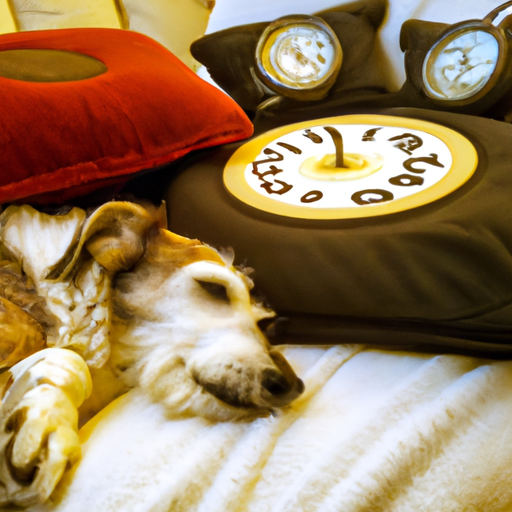Understanding Your Old Dog’s Sleep Habits
As a caregiver, you are likely attuned to your dog’s behaviors and changes. As they age, you may notice that your old friend is sleeping more than they used to. This is not necessarily a cause for alarm, as it’s a natural part of the aging process. Dogs, like humans, require more rest as they grow older to support their body’s functions.
However, it’s also essential that you know when it’s more than just old age. Excessive sleep can sometimes be a symptom of underlying health issues.
Factors Affecting Your Old Dog’s Sleep Patterns
Several factors can affect your old dog’s sleep patterns. Let’s explore some of them in detail:
-
Age: Older dogs naturally tend to sleep more than younger ones. It’s their body’s way of conserving energy.
-
Health: Health conditions, such as arthritis or dementia, can affect your dog’s sleep. Pain can disrupt their sleep, while cognitive decline can cause confusion and anxiety, leading to more sleep during the day and restlessness at night.
-
Diet and Exercise: What your dog eats and how much they move can significantly influence how much they sleep. A balanced diet and regular exercise can promote healthier sleep patterns.
How Much Should Your Old Dog Be Sleeping
On average, dogs sleep for about 12-14 hours a day. However, older dogs might sleep for up to 18 hours a day. This is normal, but remember, too much sleep or a sudden change in sleep patterns could signal a health problem.
| Age Group | Average Sleep Duration |
|---|---|
| Puppies | 18-20 hours |
| Adult dogs | 12-14 hours |
| Senior dogs | 14-18 hours |
Promoting Quality Sleep For Your Old Dog
Your role as a caregiver isn’t just to observe but to provide the best possible care for your old dog. There are ways you can promote quality sleep:
-
Create a Comfortable Sleep Environment: Make sure your dog has a comfortable, warm place to sleep. An orthopedic dog bed can provide support for their aging joints.
-
Maintain a Regular Schedule: Consistency is critical. Try to keep their feeding, exercise, and sleep schedule consistent.
-
Encourage Daytime Activity: To avoid restlessness during the night, encourage some form of activity during the day. This helps keep their body clock in check.
-
Consult a Vet: If you notice any sudden changes in your dog’s sleep, consult your vet. They can help diagnose any potential health issues and provide treatment options.
Frequently Asked Questions
1. Is it normal for my old dog to sleep all day?
- Yes, it’s normal for older dogs to sleep more. However, if you notice any sudden changes, it’s best to consult a vet.
2. My dog seems restless at night. What can I do?
- Try to encourage activity during the day to tire them out. If the restlessness continues, consider seeing a vet.
3. How can I make my old dog more comfortable at night?
- Providing a warm, comfortable bed can help. You might also want to consider an orthopedic bed for added support.
Remember, as a caregiver, you play an essential role in your old dog’s life. Pay close attention to their sleep patterns, and don’t hesitate to seek professional help if you notice anything unusual. Your old friend relies on you for their comfort and well-being.



